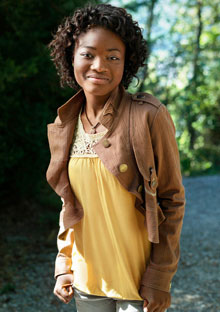Women Who Create Gifts That Give Back
The Silver Bullet

Photo: Farah Nosh
PAGE 4
Liberian refugee Lovetta Conto transforms used munitions into objects of beauty.
Even as a small child, Lovetta Conto knew she wanted to be a fashion designer. But when she told people,
they'd laugh. "They said, 'You live in a refugee camp, and you think that's going to happen?'" she
says. "But I always pictured myself in a higher place, growing up like a beautiful flower out of a mud pit."Lovetta, now 17, spent a decade in the Buduburam refugee camp in Ghana, home to 47,000 people, mostly Liberians fleeing their country's civil war and its aftermath. "I often went hungry, and there was no clean drinking water," she says. "Girls were selling themselves to survive, and there was a lot of rape." But three years ago, Lovetta's talents had a chance to bloom: She was granted a Strongheart Fellowship, under a Liberian program designed to help gifted young people who have been orphaned or uprooted by war create businesses to benefit their communities. Today she designs Akawelle (the name is a combination of aka, for "also known as," and wel'le, the word for "love" in Kpelle, Lovetta's tribal language), a line of delicate jewelry made from the spent bullets of her country's war. Half of all profits from the sale of the jewelry goes to the Strongheart House, a home in Robertsport, Liberia, for displaced children and other Strongheart fellows.
Lovetta herself was displaced when she was only 8 months old: After rebels attacked, she and her father, Larry, fled their town in central Liberia (her mother was out at the time, and Larry assumed she had been killed). "We walked for one week," he says. "We crossed rebel territory, slept in the bush. If I saw a breastfeeding mother, I would appeal to her to please give Lovetta milk."
After years of moving to escape the fighting, they settled at Buduburam. Lovetta lived with other families while her father looked for work. Cori Stern, founder of the Strongheart Fellowship, met Lovetta when she was just 12 and remembers how self-assured she was, even then. When officials said there was no need to build a school for disabled students because there were none in the camp, "Lovetta said, 'No—my best friend is blind, and they won't let him go to school because he can't see,'" Stern recalls. "The men did not like having a little girl go against what they were saying."
Stern brought Lovetta to the United States in 2006 to attend school. In Buduburam, Lovetta's schooling had been sporadic, and she did not learn to read until 2007 (despite the late start, she finished the entire Twilight series in six weeks). Still, the visit to the United States was bittersweet. Lovetta was shocked to see homeless people in a country of such abundance and thought it unfair that some should have so much while others had so little. She also couldn't understand why Americans did not do more to help her country's refugees: "It made me angry that this whole world was here when I was in my darkest moment, and no one came to help."
By turning bullets into things of beauty, Lovetta is doing her part to help. Since 2007 Akawelle has sold more than 400 necklaces and raised almost $20,000. Lovetta has also spoken at schools across the United States, and her necklaces have attracted fans like Halle Berry and Angelina Jolie. "I wear one, and my kids have her necklaces, too," says Jolie. "It was an opportunity to teach them about remarkable people like Lovetta, and pass on her message of love and tolerance."
Lovetta also wants her message to be one of hope: "I believe that whatever you go through, there is always new life, a new beginning. So even a bullet that has killed someone can be the same one to help a new generation." — Lisa Armstrong
Adorable presents with proceeds that go to charity: 10 more gifts that give back
More Stories of Giving
Aimee Lee Ball has cowritten four books, including No Time to Die (Harper Collins), a memoir with former Harper's Bazaar editor in chief Liz Tilberis.






